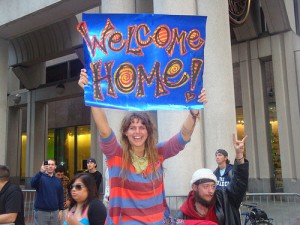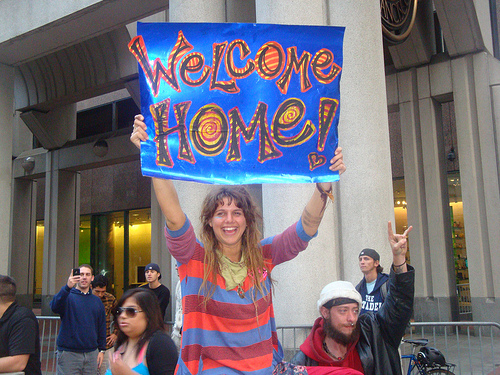On many Saturdays I answer reader questions and respond to frequent web searches.
Is Occupy Wall Street a counterculture?
My personal authority on counterculture is Counterculture through the Ages: From Abraham to Acid House by Ken Goffman (R.U. Sirius) and Dan Joy. They devote much of the first part of the book to the thorny issue of defining counterculture, but here is one part:
The focus of counterculture is the power of ideas, images, and artistic expression, not the acquisition of personal and political power. Thus, minority, alternative, and radical political parties are not themselves countercultures. While many countercultural memes have political implications, the seizure and maintenance of political power requires adherence to structures too inflexible to accommodate the innovation and exploration that are basic to the countercultural raison d’être. — from Counterculture through the Ages

In other words, counterculture is about rebellion, and revolution of a sort — but it is a revolution of images, ideas, art and personal expression. The members of a counterculture typically value independence a great deal, but its a highly individualized independence. It is an independence sometimes more comfortable heading out into the wilderness to create a temporary community away from government power structures than it is trying to overthrow or change those same restrictive structures.
At the same time, the two influence each other closely. The counterculture of the 60s was important in ending the Vietnam War, to name just one obvious example. Counterculture artists, musicians, writers, philosophers and other creators shape and spread key ideas of revolutionary or political change. At the same time, the most outward facing members of a counterculture often realize that radical political movements seek to protect the same rights that the continued health of a counterculture may depend on. When the government or others in power infringe directly on the rights of a countercultural movement, it often rapidly “radicalizes” some of its members.
[youtube=http://www.youtube.com/watch?v=95Bu7ymWxWk]
Countercultures like Burning Man, Rainbow Gathering, the punk movement, and so on may incubate the embers of revolutionary change, but it takes a different interconnected kind of movement to actually give birth to those changes. To return to our former example — which represents just one of dozens or hundreds of countercultures which have existed in the 20th century — the 60s counterculture launched the anti-war protests, but it took mainstream society to make it a success. Likewise, Occupy Wall Street attracts hippies, Burners, artists and rainbow kids — but also small business owners, veterans, the homeless, economists, and people from all walks of life.
Do polyamorous people have special reasons to Occupy?
Just like all the 99%, those who practice polyamory can face oppression, and sometimes our own special flavor of it. As we speak, Canadian polyamorists are struggling to fight court decisions that damage their right to form relationships as they see fit. Polyamory is evidence of unfit parenting in court custody battles and may cost jobs.
Yet while I think it is important for polyamorous people to join their local Occupy group, or get involved in the Occupy Wall Street movement in other ways, there’s no denying that the rights of those in non-monogamous relationships are not a core value of any major occupy group of which I am aware. While people at Occupy Austin seem open to learning about my alternative lifestyle, few seem to have prior experience.
Maybe the two are more linked than it first appears, however. Anyone who steps outside of the norm has reason to fight the 1% and the so-called moral majority. The same laws which target the poor by limiting how many unrelated people can live in a single house can also hurt the polyamorous, who have difficulty forming legally recognizable ‘families.’ Though being in a polyamorous family can mean multiple sources of income, it can also mean more mouths to feed during economic collapse and forced austerity programs.
Minority groups, including sexual minorities of all kinds, have even more reason than most to stand up for their basic rights — particularly their right to freedom of speech, and to be free of laws which restrict their liberty or pursuit of happiness.
Update 1/15: Here’s an article on relationship styles at Zucotti Park from 2011
Got a question? Ask via Twitter or using the contact info at the top of this page.
